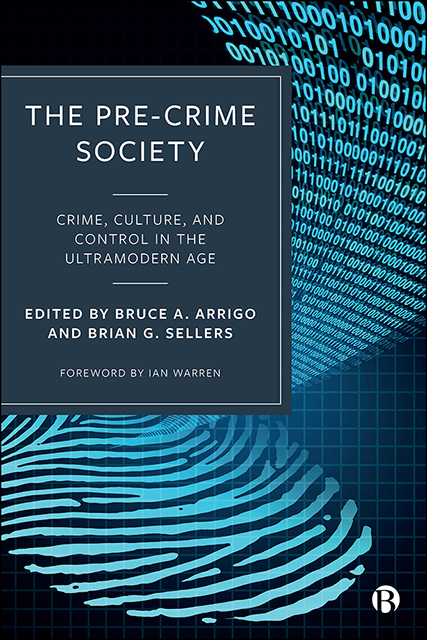Book contents
- Frontmatter
- Dedication
- Contents
- Notes on Contributors
- Foreword
- Introduction: The Ultramodern Age of Criminology, Control Societies and ‘Dividual’ Justice Policy
- Part I Theories, Theorists and Theoretical Perspectives
- Part II Institutions, Organizations and the Surveillance Industrial Complex
- Part III Dataveillance, Governance and Policing Control Societies
- Part IV Systems of Surveillance, Discipline and the New Penology
- Part V Globalizing Surveillance, Human Rights and (In)Security
- Afterword: ‘Pre-Crime’ Technologies and the Myth of Race Neutrality
- Index
Afterword: ‘Pre-Crime’ Technologies and the Myth of Race Neutrality
Published online by Cambridge University Press: 14 April 2023
- Frontmatter
- Dedication
- Contents
- Notes on Contributors
- Foreword
- Introduction: The Ultramodern Age of Criminology, Control Societies and ‘Dividual’ Justice Policy
- Part I Theories, Theorists and Theoretical Perspectives
- Part II Institutions, Organizations and the Surveillance Industrial Complex
- Part III Dataveillance, Governance and Policing Control Societies
- Part IV Systems of Surveillance, Discipline and the New Penology
- Part V Globalizing Surveillance, Human Rights and (In)Security
- Afterword: ‘Pre-Crime’ Technologies and the Myth of Race Neutrality
- Index
Summary
In these closing remarks, I wish to foreground the contribution of this text to the study of pre-crime culture and associated ‘hypersecuritization’ technologies. I also wish to highlight an emerging agenda in this field, which focuses on the racial implications of data-driven AI technologies fueling the growth of the pre-crime culture.
In terms of this timely volume's fundamental contribution, it certainly provides a solid foundation on which future theorizations and empirical analysis of ‘pre-crime’ technologies can build to broaden current understanding of their cultural, social, legal and ethical dynamics. To take these a step further, the nexus of the technologies and racial justice is a key challenge that deserves urgent interdisciplinary scrutiny. Indeed, the importance of interdisciplinarity in this field cannot be overstated, primarily because it can provide insights into the societal impacts of the technologies, building on themes distilled from the humanities, the social sciences, computer sciences and other fields. This is evident in the growth of university departments offering courses in science, technology and society (STS) studies.
Specifically, an exploration of how pre-crime technologies and racial justice intersect requires critical analysis of key interrelated logics legitimizing or at least providing the impetus for the mass proliferation of the technologies. I conceptualize the logics as: neutrality, neoconservative and neoliberal logics (see also Ugwudike, 2020). The importance of unraveling these rationalities cannot be overstated in the current digital age. As Marc Schuilenberg persuasively argues in Chapter 2 of this volume, data-driven algorithms are using patterns in large-scale data to visualize and construct the social world in particular ways while operationalizing governance strategies in an increasing array of contexts. Pat O’Malley and Gavin Smith pick up this theme in Chapter 3, in their analysis of the nexus of pre-crime and control via a ‘preventive justice’ model that emphasizes risk-reduction on the basis of algorithmic forecasts of future probabilities. Parts III and IV of this volume also address this issue albeit with greater focus on how states are mobilizing the technology for surveillance and securitization, driven by ‘big data’ analytics, and enabled by particular scientific models and political imperatives.
- Type
- Chapter
- Information
- The Pre-Crime SocietyCrime, Culture and Control in the Ultramodern Age, pp. 483 - 492Publisher: Bristol University PressPrint publication year: 2021

